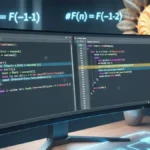Are you still using the same long codes to check prime numbers in C? Then it’s time to think smarter! With the right logic and a few savvy coding tricks, I can help you write a short, clean, and powerful Prime Number Program in C that works like a pro.
To make this guide beginner-friendly, I have clearly defined what a prime number is, the logic behind it, and a few examples. Ahead, you will find the easiest and cleanest C programming code to check prime numbers and some logical errors most beginners make.
So, let’s start your journey to code like a pro!
What Is a Prime Number?
A prime number is a whole, natural number that is greater than 1 and has only two positive divisors: 1 and itself. Remember, 0 and 1 are not prime numbers. A prime number has to be greater than 1.
Now you may think, what are the other numbers called that are not prime numbers? All other natural numbers that are greater than 1 but are not prime numbers are called “Composite numbers”.
Before we jump into the Prime Number Program in C, let’s develop an in-depth understanding of the real logic behind these numbers below.
Logic Behind Prime Number Program in C
As we know, a prime number is a number only divisible by 1 and itself. Here’s a logic on how to check if a number is prime or not:
- Start with the number “n” that you want to check.
- Step 1: If n <= 1, it’s not prime.
- Step 2: If n == 2, it’s prime.
- Step 3: For numbers greater than 2, try dividing n by every number from 2 up to n-1.
- If you find any divisor (i.e., remainder is 0), then the number is not prime.
- If you don’t find any divisor, then it’s prime.
| Note: There is a shortcut and a more efficient way for the Prime Number Program in C, which we will discuss ahead. |
Examples for Better Understanding
Example 1: n = 7
- Divisors of 7 are 1 and 7 only.
- No other number divides it evenly.
✅ 7 is a Prime Number.
Example 4: n = 15
- Divisors: 1, 3, 5, 15.
- It’s divisible by 3 and 5.
❌ 15 is Not Prime.
Easy Prime Number Program in C Code
There are several methods to check prime numbers using the C programming language. But the easiest way for beginners to write clean code is through Recursion and the Loop (square root) method.
Basic Code Using Recursion
C Programming Code
| #include <stdio.h> // Recursive function to check divisibilityint isPrime(int num, int i) { if (num <= 2) return (num == 2) ? 1 : 0; // 2 is prime, 0 and 1 are not if (num % i == 0) // if divisible, not prime return 0; if (i * i > num) // if i exceeds sqrt(num), it’s prime return 1; return isPrime(num, i + 1); // check next divisor} int main() { int num; printf(“Enter a number: “); scanf(“%d”, &num); if (isPrime(num, 2)) printf(“%d is a Prime Number.\n”, num); else printf(“%d is NOT a Prime Number.\n”, num); return 0;} |
Explanation
Step 1: Function
- isPrime(num, i) is the function
- num = number to check.
- i = current divisor being tested.
Step 2: Special Cases
- If the number is less than or equal to 1 → not prime.
- If the number is 2 → prime (smallest prime)
Step 3: Checking Divisibility
- If num is divisible by i (like 12 % 2 = 0) → it is not prime.
- If i * i > num (means we checked enough divisors) → it is prime
Step 4: The Recursion
- If we still don’t know, the function calls itself with the next divisor (i + 1)
- This keeps repeating until either:
- A divisor is found → Not Prime.
- Or we reach the stopping condition → Prime
Step 5: What Happens in Main
- User enters a number.
- We call isPrime(num, 2) → start checking from divisor 2
- Based on the return value:
- 1 → Prime
- 0 → Not Prime
Example:
- Number = 7
Check 2 → not divisible.
Check 3 → not divisible.
3*3 > 7 → stop → Prime ✅
- Number = 12
Check 2 → divisible → Not Prime ❌
Basic Code Using Loop (Square Root)
C Programming Code
| #include <stdio.h>#include <math.h> int main() { int num, i, isPrime = 1; // assume prime first printf(“Enter a number: “); scanf(“%d”, &num); if (num <= 1) { isPrime = 0; // 0 and 1 are not prime } else { for (i = 2; i <= sqrt(num); i++) { if (num % i == 0) { isPrime = 0; // found a divisor break; } } } if (isPrime) printf(“%d is a Prime Number.\n”, num); else printf(“%d is NOT a Prime Number.\n”, num); return 0;} |
Explanation
Step 1: Input and Setup
- Assume the number is prime (isPrime = 1)
Step 2: Handle Small Numbers
- If the number is <= 1 → it is not prime
- Because 0 and 1 are not prime numbers
Step 3: Checking Divisibility
- Instead of checking all numbers up to n-1, we check only up to √n
- Why? If a number has a factor larger than √n, the smaller matching factor would already be found
Step 4: The Loop
- Start from i = 2 up to sqrt(num)
- For each i:
- If num % i == 0 → number is divisible by i → not prime
- Stop checking further (use break)
Step 5: Final Decision
- If no divisors are found → the number is prime
- If any divisor is found → the number is not prime
Example:
- Number = 29
√29 ≈ 5.38 → check divisors 2, 3, 4, 5
None divide 29 → Prime ✅
- Number = 36
√36 = 6 → check divisors 2, 3, 4, 5, 6
36 % 2 = 0 → Not Prime ❌
Common Errors & Quick Fixes for Beginners
Beginners often make simple mistakes while writing the Prime Number Program in C that show errors. Here are some potential errors and their quick fixes:
1. Checking divisibility up to n instead of √n
- Error: Using for(i = 2; i < n; i++) can be slow for large numbers.
- Quick Fix: Check only up to i <= sqrt(n) to save time
2. Not handling numbers ≤ 1 correctly
- Error: Treating 0 or 1 as prime
- Quick Fix: Always include a check: if(num <= 1) → not prime
3. Assuming 2 is not prime
- Error: Skipping the number 2 or treating it incorrectly
- Quick Fix: Include a condition: if(num == 2) → prime
4. Forgetting to break the loop when a divisor is found
- Error: Continuing the loop even after finding a divisor → unnecessary checks
- Quick Fix: Use a break as soon as a divisor is found
5. Ignoring negative numbers
- Error: Treating negative numbers as prime
- Quick Fix: Add a check: if(num <= 1) → not prime
6. Confusing recursive logic
- Error: Forgetting base cases in recursion → infinite calls
- Quick Fix: Always define:
- Stop if num <= 2
- Stop if divisor i*i > num
- Stop if divisible
Conclusion
Prime Number Program in C is a popular beginner’s exercise code. However, most of the time, programming learners end up getting confused with complex and tricky coding logic. I hope you have developed a clear understanding of prime numbers’ real logic and found the methods easy.
Make sure to check the potential errors and practice on your own. If you have any confusion or face any more errors, let me know through the comments below.


